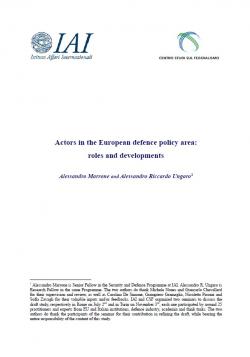Actors in the European Defence Policy Area: Roles and Developments
This study analyses the roles played by different actors in the European defence policy area, with a specific focus on the developments occurred in 2013-2014. The subjects analysed encompass main European national governments, and EU actors such as the European Commission (EC), the High Representative for Foreign Affairs and Security Policy and Vice-President of the Commission (HRVP), the European Defence Agency (EDA) and the European Parliament (EP). While recognizing the importance of a comprehensive approach, the intrinsic links between defence and security, as well as the linkage of defence and security policies with foreign policy, the study focuses in particular on the European defence policy area, from both a military and an industrial point of view. European armed forces are deployed together in most missions abroad, whether under NATO, UN, EU aegis or within ad hoc coalitions. The European Defence Technological and Industrial Base (EDTIB) presents a dense network of players, which both compete with each other on the EU and global defence markets and cooperate within multinational procurement programmes. Moreover, since the 1990s the European integration process has begun to affect also the Union's foreign, security and defence policy, as well as the EU defence market, with a growing role of EC and EP. As a result, national governments manage their respective defence policy in an highly regulated and institutionalized EU context, which presents both limits and opportunities to their action. The analysis aims to increase the understanding of recent developments of the roles played by such actors in the European defence policy area, as well as of the enduring dynamics which underpin their interplay. This understanding in turn poses policy-makers and public opinion in a better position to engage with various European interlocutors in this area, with a view to the June 2015 European Council which will deal again with defence issues.
Report of the Istituto affari internazionali (IAI) and the Centro studi sul federalismo (CSF). The study was presented in two closed-door seminars - respectively on July 2 in Rome and on November 3 in Turin ("Quali attori per una politica di difesa europea? Ruoli e possibili sviluppi") - including experts and practitioners from Italian and EU institutions, the defence industry, academia and several think tanks.
-
Details
Turin, Centro studi sul federalismo (Csf), November 2014, 67 p.
Introduction
Executive summary
1. The EU actors in the European defence policy area: an evolving landscape
1.1 The European Commission (EC)
1.2 The High Representative for Foreign Affairs and Security Policy/Vice President of the EC
1.3 The European Defence Agency (EDA)
1.4 The European Parliament (EP)
2. The national actors in the European defence policy area: still the main players
2.1 Military spending and defence industry: fragmentation versus consolidation
2.2 The role of large and small EU military spenders
2.3 The role of regional and bilateral cooperation among MSs
2.4 The role of extra-EU international bodies set up by EU Member States
3. The preparation of 2013 European Council on defence: a complex interplay
3.1 The 2013 EC Communication: setting the European agenda on EDTIB
3.2 The HRVP Report: proposing an acceptable compromise
3.3 The EP reports and conferences: a contribution to the debate
3.4 The December 2013 European Council Conclusions: decisions as part of a process
4. The 2014 developments in the European defence policy area
4.1 The impact of the European Parliament elections
4.2 The role of EU actors in 2014
4.3 The role of the national actors in 2014
5. The roles of the US and NATO with respect to the European defence policy area
6. Conclusions



